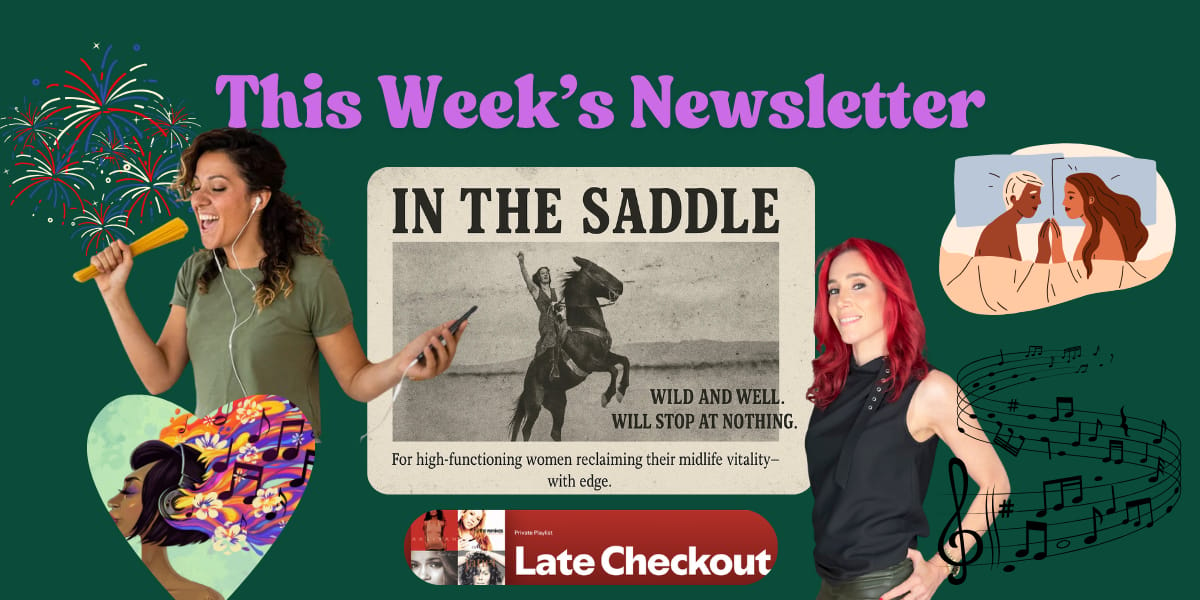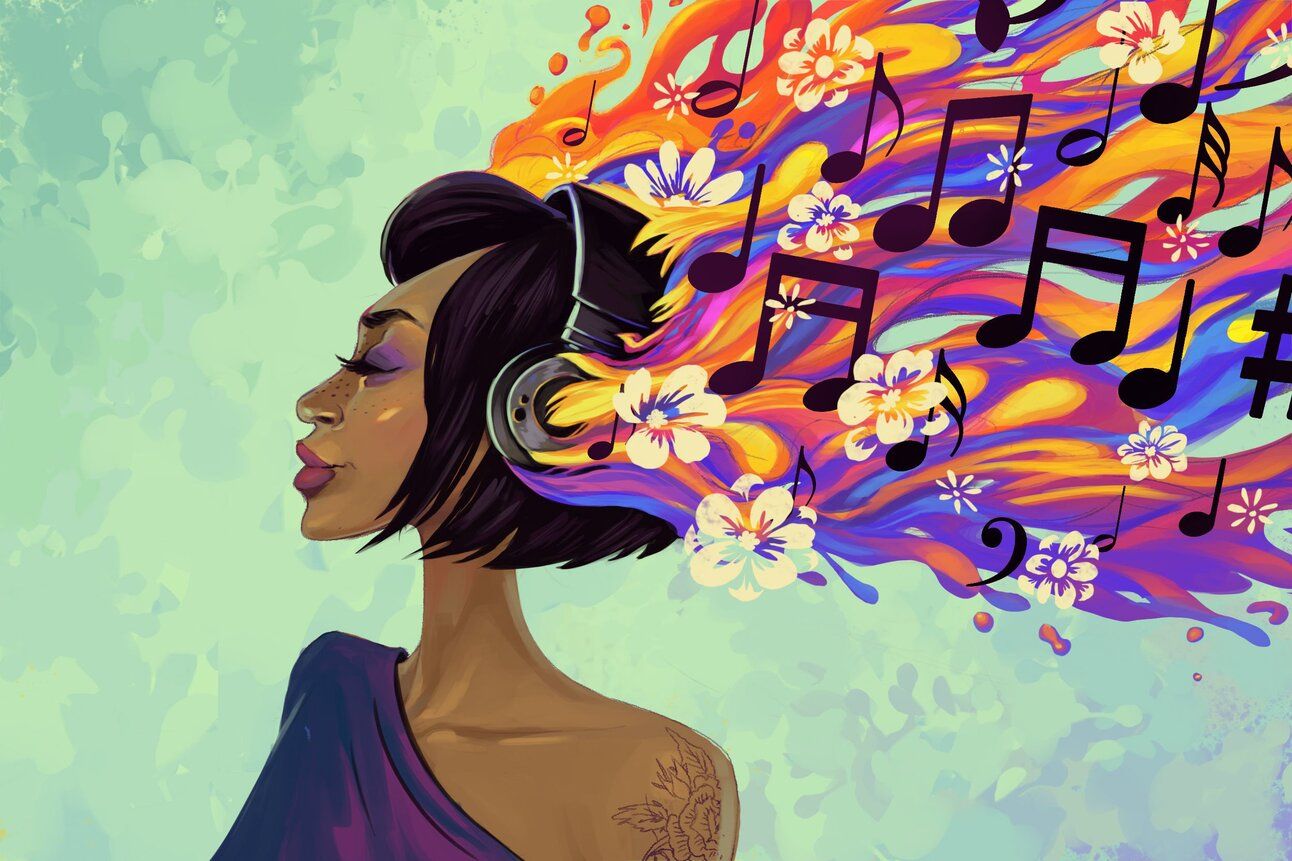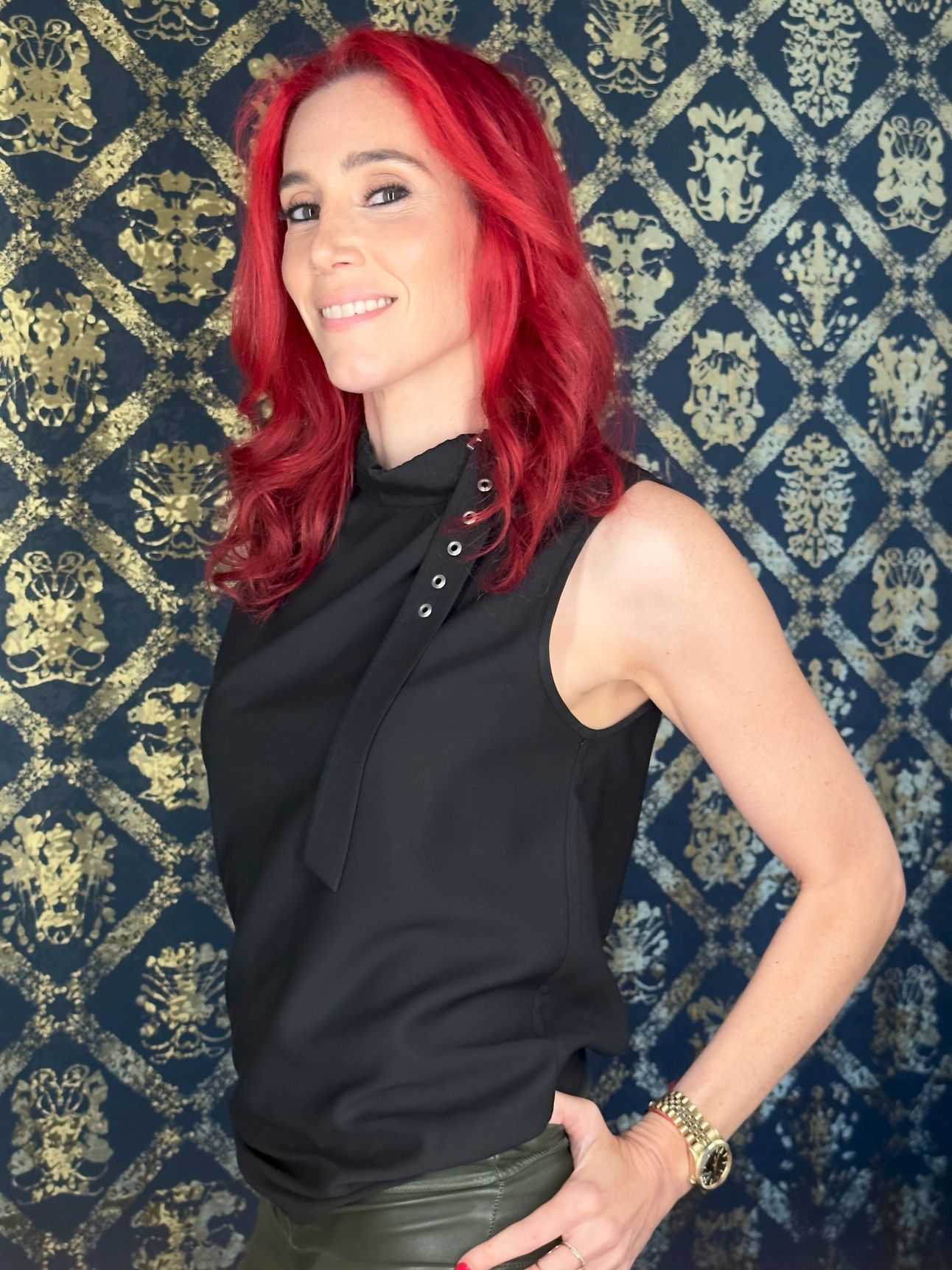
Jackie's Take: What's on My Mind in Women's Wellness ✍ 🤔 📰
🎧 Late Checkout: Your Invitation to the Party You Deserve
💫 A Special Edition of In the Saddle 👩🎤
Ladies, we need to talk. And I mean really talk—the kind of conversation you'd have with your closest friend over wine, where all the pretenses drop and we get real about what's actually happening in our bedrooms.
If you've been feeling like your sexual desire has gone into witness protection, if arousal feels like trying to start a car with a dead battery, if you're wondering where that woman who used to enjoy sex disappeared to—first, take a deep breath. You're not alone, you're not broken, and you're definitely not too old for amazing sex.
What you are is hormonally different than before, and nobody prepared you for how dramatically that would change the game. So I did something a little crazy: I reached out to a celebrity DJ who also happens to be a licensed therapist specializing in neuroscience and music.
Today, I'm introducing you to our collaboration—something that's going to change how you think and is actually FUN: "Late Checkout," a science-backed musical playlist that helps you work with your midlife body instead of against it.

🧠 The Truth About Your "Empty Tank"
Let's start with some real talk about what's happening in your body. When estradiol and testosterone start declining—which happens gradually in perimenopause and more dramatically after menopause—you're not just losing lubrication. You're losing the neurochemical support system that used to make desire feel effortless.
In your brain: Lower testosterone and estradiol levels affect motivation, confidence, and your ability to shift into that relaxed, receptive state where pleasure lives. That little voice that used to whisper "this could be fun" gets replaced by one that says "this feels like work."
In your body: Vaginal dryness, loss of elasticity, decreased blood flow—your body is literally asking for more time and attention than it used to need.
But here's the plot twist that changes everything: responsive desire isn't your consolation prize. It's actually the norm.
Let me explain what I mean by responsive desire: instead of feeling spontaneously aroused out of nowhere (like you might have in your twenties), your desire responds to and builds from physical touch, emotional connection, and the right conditions. You don't start wanting sex—you start wanting it once you begin engaging in intimacy. It's desire that awakens through the experience itself, not before it.
Even women with robust hormones often experience responsive rather than spontaneous desire, especially in long-term relationships. The difference is that when your hormonal gas tank was full, you might not have noticed the process as much—the arousal happened faster, so it felt more automatic.
Your body isn't broken—it's evolved. And it's asking you to evolve with it. But here's what often happens instead: we fight against these changes, creating tension where there should be acceptance.
One of the most common patterns I see in my practice is what sex therapists call the "bristle response"—when your partner reaches out to touch you and you feel your whole body recoil. This isn't about not loving your partner; it's about your nervous system anticipating pressure rather than enjoying connection. When we're constantly worried that any touch will lead to expectations we're not ready to meet, our bodies learn to protect us by pulling away.
We have to break that automatic assumption that touch always leads to sex, and instead create space for touch to just be touch—connection without agenda.
@vanessaandxander The dreaded Bristle Reaction 😬 Ever feel your body tense up when your partner tries to touch you? Whether it’s a hug, a gentle touch, or a... See more
🍽 Foreplay IS the Main Event
Here's the biggest lie you've been told about sex: that foreplay is just the warm-up act before the "real" show. Honey, that's like saying appetizers are just something to get through before the entrée. What if the appetizers ARE the meal, and they're absolutely delicious?
This reframe is crucial for midlife sexuality because your body is designed to need more of what we've been calling "foreplay." Your hormonal changes aren't working against you—they're inviting you to discover a richer, more nuanced way of experiencing pleasure.
When you understand that the goal isn't to rush through connection to reach some other destination, but to fully inhabit every moment of touch and sensation, everything changes. Suddenly, you're not behind schedule or taking too long. You're exactly where you're supposed to be.
🎵 The Barilla Inspiration Meets Sexual Medicine
Remember when Barilla's pasta playlists went viral? They created Spotify playlists timed exactly to cook different pasta shapes to perfection. Press play, drop the noodles, music stops, al dente pasta. Brilliant in its simplicity.
Working with DJ Hesta Prynn—a licensed therapist who understands how music affects the brain—we thought: if timing matters that much for pasta, imagine how crucial it is for pleasure. So we created the midlife sexual wellness equivalent: a playlist that honors the time your body actually needs while making that time absolutely delicious.
🎶 Meet "Late Checkout": Your Musical Medicine
This isn’t just a sexy playlist—it’s a 22-minute, science-backed soundtrack designed to move your midlife body into full-on pleasure mode. Arousal takes time (especially now), and this builds in just the right way to help your brain, blood flow, and nervous system get there—without the pressure.

We designed it to feel like getting ready for a Saturday night in 1999: tube top, low-rise jeans, frosted eyeshadow, and that unmistakable feeling that something good was about to happen. That version of you? She’s not gone. She just needs the right cue to reappear.

Here is the lineup 🎹:
🎵 "That's The Way Love Goes" – Janet Jackson (4:25):
Your transition song. Janet's hypnotic rhythm signals to your nervous system: we're shifting gears now. This is where you move from "mom mode" into "I'm a sexual being" mode.🚣♀ "Rock The Boat" – Aaliyah (4:34):
Building connection. Aaliyah's sultry delivery creates the perfect backdrop for hands to start wandering, for you to begin really inhabiting your body.🔥 "Fantasy (feat. O.D.B.)" – Mariah Carey (4:50):
The main event. The longest track gives you space for full-body exploration, for taking your time, for remembering that pleasure is the point.💓 "Love Like This" – Faith Evans (4:35):
Deeper emotional territory. This is where arousal often peaks for women—when physical sensation meets emotional connection.😌 "No Scrubs" – TLC (3:34):
Your recovery song. Perfect for aftercare, often sparking laughter and conversation while reinforcing your worth.
(Keep reading—the private Spotify playlist is linked at the end of this section. You’re going to want to press play. ▶ )
🧬 The Science of Getting to the Party
Your sexual response operates on four levels that all need regulation: your nervous system (shifting from stress to receptivity), your brain (motivation and presence), your blood flow (arousal takes time), and your hormones (working with what you have).
Music is magical because it actively participates in regulating all four systems. The right songs don't just set a mood—they help shift your nervous system, trigger positive brain chemistry, improve circulation, and create the conditions for your body's natural responses to emerge.

Illustration by Aaron Sacco
💞 You're Not Alone in This
If you're reading this thinking "finally, someone gets it," you're part of a community of women who are redefining what sexuality looks like in midlife. We're done apologizing for needing more time, more attention, more intention. We're done pretending that quick encounters leave us satisfied when they don't.
We're embracing responsive desire as a sophisticated way of experiencing sexuality that can lead to deeper satisfaction than anything we had in our twenties. We're understanding that our changing bodies aren't working against us—they're inviting us to discover new dimensions of pleasure. 🎆
📝 Your Simple Action Plan
This weekend (or whenever you are ready to prioritize your pleasure), whether you are partnered or solo:
🗣️ Say, "Hey Alexa, play my Late Checkout playlist."
🛋️ Change it up: Why not take this somewhere new?
→ The living room couch
→ A cozy spot on the floor with pillows
→ Even a different bedroom if you have one
(Breaking out of your usual location helps signal to your brain that something different is happening.)⏰ Pro tip: Have sex as early in the evening as you can.
(Stop leaving intimacy for the very end of the night when you’re exhausted. Your pleasure deserves prime time, not leftover energy.)🎶 Let the playlist become an anchor—a fun trigger that you control.
Every time you hear these songs, your body will start to remember:
→ This is pleasure time
→ This is connection time
→ This is MY time🔁 Let the music guide your timing.
→ Focus on sensation, not destination
→ Remember that foreplay IS sex
→ Communicate what feels good
→ Honor your recovery time
The playlist provides structure, removes pressure, creates transition, and gives you permission to take the time you actually need.
Because here's what I want you to know:
🎉 The party isn't over. It's just getting started. And you deserve to be there, fully present, enjoying every single moment.
🎸🎵 JOIN THE LATE CHECKOUT PLAYLIST HERE 👈 👈 👈
P.S. I'm dying to know: What song from your late 90s/early 2000s era would you add to this playlist? Let's crowdsource the ultimate midlife pleasure soundtrack together. 🎶
What nostalgic song would you add to our playlist?
P.P.S. If this playlist resonated with you (and by 'resonated' I mean you know exactly what I mean 😉), tag us (me and @hestaprynnmusic on IG) with #LateCheckoutChallenge and show us where you're listening! 👂
🔊 Bonus: Meet the Genius Behind the Playlist
If you loved this playlist concept, it’s time to meet the genius behind it. Hesta Prynn is a celebrity DJ and licensed therapist who’s performed for icons like Post Malone, Questlove, and Amy Schumer—and now she’s bringing that same energy to your wellness toolkit.
She created Music Connection Therapy, a method that blends music and neuroscience to help people get clear, get unstuck, and make real change. Her new course, Music Connection Therapy: Level One, launches this summer, and her podcast Music Is Therapy debuts in January on iHeartMedia.
📝 Want to be first in line to sign up? 👉 Join the VIP Waitlist 💫
📲 Follow @hestaprynnmusic on Instagram
Trust us: your nervous system has never danced this hard—and healed this well 💃🪩

Barilla Pasta on Spotify
🇺🇸 A Fourth of July Note to my ITS Fam🇺🇸
I'm ending it here for this week—this special edition was intense (in the best way), and I know you've got summer fun calling your name. BBQs, fireworks, pool time, and precious moments with your loved ones await. 🎇🧑🤝🧑
Wishing you the happiest 4th of July weekend, and as always, thank YOU for being here. Your support means everything. 🤗
Now go celebrate your independence—all of it. ❤️

Saddle Up & Spread the Word 🏇💨

If you’re still reading, thank you. In the early days of a business, every subscribe, like, and share makes a real difference. Your early support means so much as I keep building In the Saddle - both the newsletter and this community ⭕
To share — Just click and copy this link: https://inthesaddle.beehiiv.com/
If you’re a brand, expert, or just someone with an excellent story to tell in the wellness, longevity, or sexual health space, I’d love to connect! I am always open to hearing ideas for ITS content and collabs. ✏️ 🏇🔥
With gratitude always,
Jackie Giannelli, FNP-BC, MSCP
Founder, In the Saddle
What did you think of today's newsletter?
Medical Disclaimer:
The content provided in this newsletter is for informational and educational purposes only and is not intended as a substitute for professional medical advice, diagnosis, or treatment. Nothing contained herein should be construed as medical guidance or the practice of medicine. You should always seek the advice of your physician or other qualified healthcare provider with any questions you may have regarding a medical condition or treatment. Never disregard professional medical advice or delay seeking care because of something you read in this newsletter. Use of the information provided is at your own risk. No clinician-patient relationship is formed through this content.


